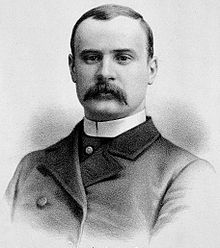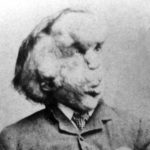Sir Frederick Treves was known as the first English surgeon to perform an appendectomy in 1888. He was later appointed “Surgeon Extraordinaire” to Queen Victoria. He wrote articles for the British Medical Journal and later books on surgical procedures, historical characters, world travels, and experiences in a South African field hospital during the Second Boer War.
Sir Frederick was appointed as an “Honorary Sergeants Surgeon” to King Edward VII and later that year was knighted as “King Commander of the Royal Victorian Order.” He was also honored with a “baronetcy” after performing a radical appendectomy on King Edward VII which saved his life. Treves was financially able to take an early retirement and continued to serve the royal family as Sergeant Surgeon.
Quite an impressive resume isn’t it? However with all the fame among royalty and great medical achievements, he is remembered for his work with a single man, Joseph Merrick, better known as the “Elephant Man.”
Joseph Merrick had nothing but hardship in life. During his early years, he developed a debilitating condition which left him with a grotesque physical appearance. As a young child, his mother died. His father remarried and he with his new wife rejected the sickly, deformed child. After leaving home, he spent four years with a workhouse where he suffered harsh conditions and extreme abuse from others. Eventually, Joseph was offered and accepted a job as an exhibit in a “freak” show where people would pay to stare at him, gasping and poking fun at his appearance.
It was during this time that Joseph briefly met Frederick Treves who did a physical examination of him. When the show was closed down by police, Joseph took a position with a show that would travel through Europe. However his manager stole all the money he had saved and left Joseph penniless on the city streets in Belgium. He managed to get back to London and when found by police, Joseph was near death and suffering extreme malnutrition. The policemen found a business card with Dr. Treves name that Joseph had kept in his pocket and sent him to be examined by him.
Though there was no cure for Joseph’s condition, Dr. Treves created a permanent home in the hospital basement where Joseph could live out the rest of his life. Dr. Treves visited every day and they developed a very close friendship, discussing poetry that Joseph enjoyed writing. Because of Dr. Treves influence with society and royalty, he introduced this community to his friend Joseph. The result was that though they were from worlds apart, those more privileged in London society regularly visited Joseph in the hospital.
Dr. Treves saw Joseph not as a side show spectacle, but as a fellow human being. Though deeply flawed physically, he had value and was worth knowing and befriending. Treves made the effort and sacrifice to help one who was not only destitute of physical necessities, but also needed a compassionate friend.
People are often concerned about how others will accept them if they associate with an outcast. However, Dr. Treves had the courage to make a personal connection and go the extra mile by introducing him to the socially elite.
While we may not remember the impressive academic and professional achievements of Dr. Frederick Treves, the kindness and compassion shown to a societal outcast has immortalized him to the world.
Hebrews 6:10 says that God will not be unjust to forget our work and labor of love which we show toward others in His name. When we seek the outcast, speak up for those who have no voice, and do good to them in the name of Jesus, we will be remembered by the One who is far greater than any in this world.
Proverbs 31:8-9 says, “Open your mouth for the speechless, in the cause of all who are appointed to die. Open your mouth, judge righteously, and plead the cause of the poor and needy.
Joseph Merrick (1862-1890)


You must be logged in to post a comment.